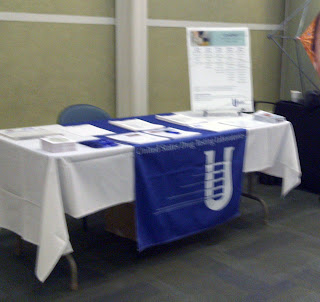ASA Show at McCormick Place
Showing: United States Drug Testing Laboratories
Doug Lewis showing off the booth.
Doug and Victoria welcoming conference goers.
Jessica Droze Program Director of Greenberg and Sucher , Victoria Lewis and Nancy Parra. The female faces of USDTL at the ASA show.
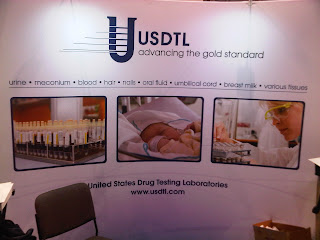
Our Booth back drop.
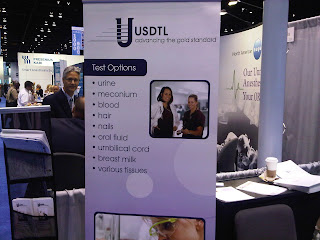
Our side banners.

Victoria Lewis ready to welcome conference goers on Friday.
Patrick Lavelle, our Forensic Account Executive proud of our booth.
Having a great time sharing our story and our testing and addiction program solutions.
Saturday, Oct 8th The Chicago Tribune ran an article entitled: “Proposal to test Lake Zurich High athletes for drugs divides parents: Critics say such programs violate rights; supporters say they save lives.”
The reporter, Lisa Black, spoke about the protestations from parents over privacy rights but schools have historically used random drug testing on students in extracurricular activities. Time and again testing has been shown to improve outcomes. Today they test using hair samples. According to the article:
“Hair samples check for five illegal drugs, which can be detected up to 90 days after use. The school administers about 1,350 tests annually, spending $65 on each— costs covered by tuition…”
This is a basic test panel in use for years. Current testing available includes over 14 types of drugs plus EtG an alcohol biomarker found in hair and nails that can not only detect use, but can detect the difference between binge drinking and social drinking– something that, according to the article, was of concern to parents and administrators alike.
As a local company we specialize in testing children/adults (using nails, hair, blood, oral fluid and urine) and newborns (through umbilical cord tissue and meconium) for exposure to substances of abuse and alcohol. It is our mission to help identify problems early on so that physicians, parents and courts can help lower Fetal Alcohol Spectrum Disorder symptoms as well as catch and possibly reverse addiction problems in teens and adults.
For more information feel free to call Patrick Lavelle, Forensic Account Executive, USDTL, Inc. at 847-375-0770 and check our website: https://www.usdtl.com/
You can read the full article here.
Two days after the press release announcing our new CordStat EtOH assay, USDTL serves it’s first client testing umbilical cord for alcohol biomarkers. Welcome CordStat EtOH customers:
.jpg)
Specimen custodian, Senovia pulled the sample
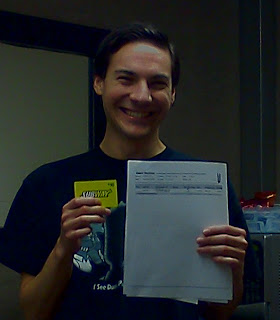
Justin ran the first CordStat EtOH batch
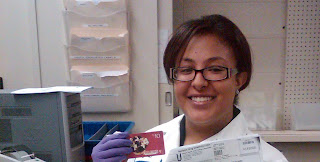.jpg)
Kyla accessioned the specimen.
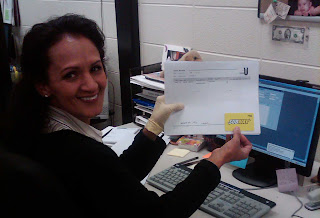.jpg)
Rosie reviewed and posted the result.
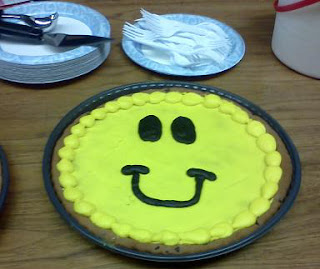
Our press release regarding our cutting edge new assay for alcohol biomarkers in umbilical cord has been picked up in five languages. It was also picked up by Good Tweets. We are serious about advocating for healthy babies. If you want more information please check out our website:https://www.usdtl.com/.
This week our representatives will have a table at the Chicago Chapter CLMA meeting. Stop by and introduce yourself to our new Forensic Account Executive, Pat Lavelle and pick up more information about our new test.
Our Clinical Projects Manager, Bob Demaree, is in Omaha and Des Moines this week visiting hospitals and manning a table at COOPCARE. If you are in the area, stop by and say hi~
Next week we are excited to announce a new testing assay. Watch for the press release and informational mailing.
What a busy week we had at USDTL last week. Our President and Scientific Director, Douglas Lewis and our Executive Vice President Veronica Lewis attended the 2011 Conference for Lawyers Assistance Programs (CoLAP) in Tampa, Florida. While Account Executive Bob Demaree and Victoria Lewis attended The National Association of Neonatal Nurses Conference (NANN) in Orlando.
“CoLap was a very good meeting with friendly faces and strong interest in our Alcohol Bio Marker Tests for hair, nails, and blood (NailStat; HairStat and PEthStat),” Doug Lewis said. “We were able to have some great conversations about the advancements in testing. We’ll definitely be back next year.”
Our PEthStat test can determine individual levels of alcohol consumption while ruling out incidental exposure. HairStat can identify usage up to three months after for most drugs and NailStat offers similar advantages but provides a detection window of up to eight months after last usage. Which is an advantage when determining court cases especially in custody litigation.
“NANN was a great conference,” Victoria Lewis stated. “We had a lot of good conversations about what we test for and problems nurses have in detecting and determining drug and alcohol use in mothers that result in harm in their newborns. It was a very interesting conversation.”
USDTL is introducing MecStat EtOH which provides a sensitive and reliable method to identify fetal alcohol exposure at birth. While our CordStat test uses umbilical cord testing to provide a higher level of sensitivity for certain drugs.
If you were at either conference and have more questions please check out our website:https://www.usdtl.com/ or call 800. 235.2367 and speak to one of our account executives.
Q: What can our organization do if we strongly suspect that an individual was drug-exposed, but the specimen results came back negative?
A: All of USDTL’s clients can “dispute” a negative result and request a “re-test” for one or more specific drug classes that are suspected of being present. The re-test is a concept routinely used in workplace urine testing, where a subject disputes a positive result and requests a re-test, which is a re-confirmation of the specimen with a cutoff at 40 percent of the original confirmation cutoff. For non-workplace cases, clinical professionals may believe that drug exposure occurred and dispute the negative finding, which results in a re-confirmation of the disputed drug class at 40 percent of the confirmation cutoff. This re-test then becomes the result of record for the case.
To order a re-test, fax or email USDTL Client Services a re-test request on your letterhead and state the test(s) requested, the subject’s demographic information, the USDTL lab number and your contact information. You can also call Client Services with the case information. Our representative will provide you with the necessary paperwork for you to sign and return to initiate the re-test process. Once the paperwork is in order, Client Services will return a re-test result to you in one to two working days. If you have any questions after receiving the results, please contact Client Services and they will either assist you or direct you to one of our forensic toxicologists to discuss the case with you.
- Umbilical Cord Tissue Testing for SSRIs
- A Comparison of Turnaround-Times for Two Popular Specimen Types Used for Newborn Toxicology: Meconium and Umbilical Cord Tissue
- Using Umbilical Cord Tissue to Identify Prenatal Ethanol Exposure and Co-exposure to Other Commonly Misused Substances
- Toxicology as a Diagnostic Tool to Identify the Misuse of Drugs in the Perinatal Period
- Specimen Delay
- Drug Classes and Neurotransmitters: Amphetamine, Cocaine, and Hallucinogens
- Environmental Exposure Testing for Delta-8 THC, Delta-9 THC, Delta-10 THC, and CBD
- Bromazolam and Synthetic Benzodiazepines
- October 2024 (5)
- March 2024 (1)
- February 2024 (1)
- January 2024 (3)
- December 2023 (1)
- November 2023 (1)


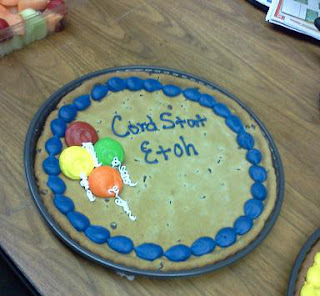
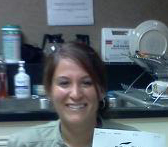.jpg)
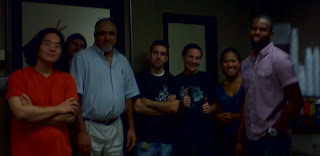
.jpg)
